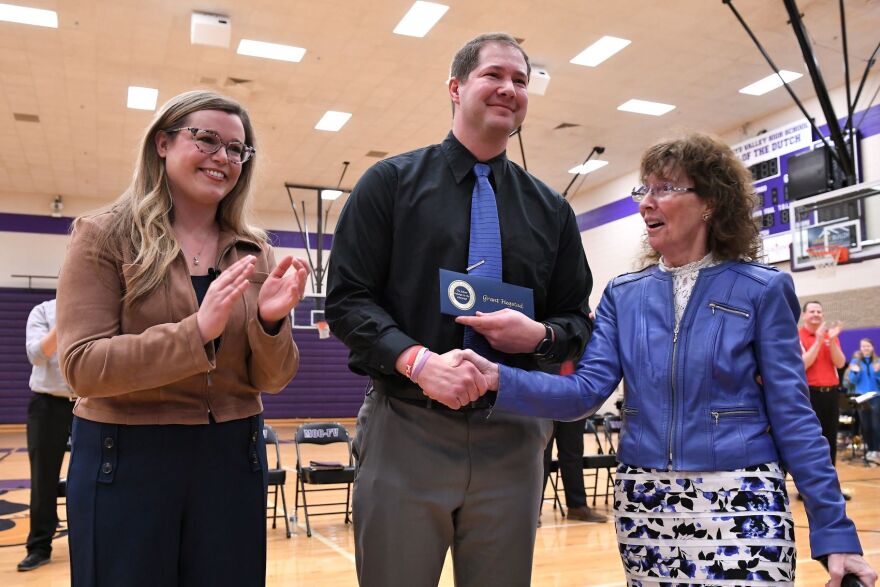Iowa schools have seen a big jump in the number of students participating in work-based learning. The Iowa Department of Education recently reported that 45% of the class of 2025 participated in work-based learning, an increase of almost 76% in two years.
During a recent news conference in Des Moines, Iowa Department of Education Director McKenzie Snow said that career-connected learning changes lives.
“It’s empowering communities and it's strengthening economies through the hard work of students, educators and employers,” Snow said. “The work of our educators and employers is making a difference for the 15,154 students in the class of 2025 who accomplished a work-based learning experience, earned durable skills, prepared for in-demand careers and are now realizing their futures.”
State legislation passed this year requires career exploration starting in fifth grade. Plus, students graduating in 2026 will be the first to receive industry-recognized credential seals on their high school diplomas.

Iowa Workforce Development Director Beth Townsend said expanding opportunities for students to participate in work-based learning programs is critical to developing Iowa's future workforce.
“... It creates awareness of high-quality jobs in their own backyard, teaches students how to work and communicate in the workplace and provides employers the opportunity to create long-term relationships with students in their community,” Townsend said. “Registered Apprenticeships, youth apprenticeships and internships provide our students hands-on training by employers and helps prepare them for success in any industry they decide to work in.”
Success stories in multiple school districts
Officials also recently touted a new regional career center in Denison funded by $2 million in grants from the Iowa Department of Education, which will serve students from surrounding school districts. They can take courses in automotive technology, nursing, agriculture, business and education — fields that are facing shortages of employees.
The principal of Sioux City’s Career Academy, Eric Kilburn, said he wished similar programs were available when he went to school. Students at the Career Academy can choose from more than 30 programs and even earn college credit.

“I spent a year figuring out I wasn't going to be an electrical engineer, and it took tens of thousands of dollars at Iowa State to recognize that wasn't where my life was taking me,” Kilburn said. “If 25% of the kids in this program find their passion, I think that's a win because it means 75% of kids found what they're not interested in, and that is a bigger success in my mind.”
Vance Dudley, a senior at West High School in Sioux City, explores his passion for podcasting at a studio located in the district’s Career Academy. He hosts a program, called Students On, as an intern for the school district.
“I learn a lot doing that and it’s very fun,” Dudley said. “And just being able to be unfiltered and have conversations is just such an amazing opportunity.”

The Career Academy, which formally launched about eight years ago, examines employment trends in the state to determine which fields students should learn. Federal and state grants help cover some of the costs to help educate 1,000 students a year. Kilburn said the program consistently outperforms state averages in work-based learning and college readiness indicators.
“Health sciences has a critical need. There are also more kids going into business, and believe it or not, in Iowa and the Midwest, there’s a large growing need for hospitality, so we created a hospitality pathway,” Kilburn said. “This is the best thing happening in the entire region.”
Another northwest Iowa school district receiving accolades is MOC-Floyd Valley in Orange City.
Assistant Principal Grant Hegstad oversees the program as the extended Career Experiences coordinator. He said that half of the school's 100 seniors participate in the program, which includes paid apprenticeships. Some even secure good-paying, full-time jobs after graduation, he said.

“To just help shift their mindset from being that of a student to that of being a professional,” Hegstad said. “A lot of the 'adulting skills' that we sometimes just assume they have, and then they get launched into the real world, and we go, ‘Why don't these kids have these skills?’ So, we really work to grow them as innovators, as problem solvers.”
Hegstad received a $25,000 award from the Milken Family Foundation in 2024 for his work helping the program grow.
“I think the thing that I still just enjoy the most about teaching is the chance to build relationships with kids — the chance to have an impact on their lives and hopefully to help set them up for whatever comes next,” Hegstad said. “I just think we're in a healthier balance that fits the needs and the wants and the desires of what our students are, but also continues to provide for the needs of our workforce.”
One student's future aspirations after an impactful internship
Dudley, who will graduate from West High School soon, already has a taste of the world outside of high school. Besides interning for the school district, he also works full time as a car wash supervisor to save money for vehicle repairs, a planned trip to Japan and college.
“I've been doing well, and so now I do a lot of the technical stuff behind the scenes at the car wash too, which is just fun,” Dudley said. “I get to learn every day, so it's great.”
Dudley dreams of attending Juilliard in New York City to study acting or Duke University to pursue a law degree. Either way, he said the skills he learns while hosting a podcast as an intern for the Sioux City School District will help.
“The work you wanna go into, you're not gonna know what it's like by just learning about the work you're gonna go into," he said. "You'll know by working the work you go into, and this gives you an opportunity to do that and see if you like it. If you like it, you can pursue it. If you don't like it, don't pursue it."






